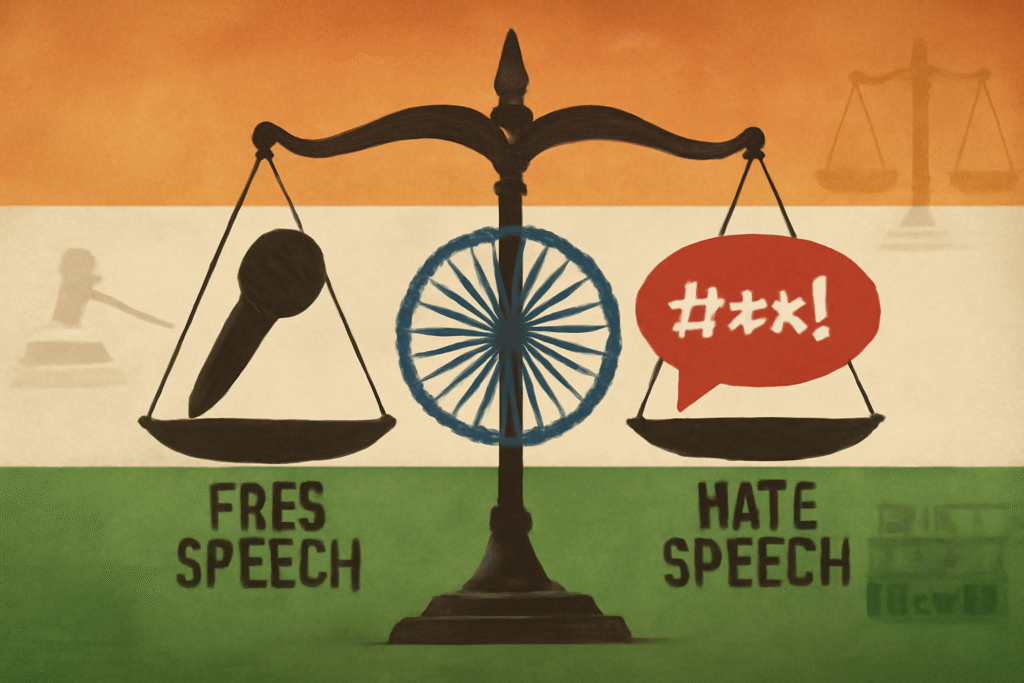Published On: August 14th 2025
Authored By: S. Nather Nisha
Chennai Dr. Ambedkar Government Law College, Pudhupakkam
ABSTRACT
In today’s app-ruled economy, the word “gig” has become a buzzword trendy, flexible, digital. But behind that word lies a complex reality. For millions of Indians, gig work is not a side hustle. It’s their only means of survival. They deliver food under scorching heat, drive cabs through the night, repair appliances at stranger’s homes all under the promise of freedom, but in truth, without any real security.
These gig workers the engine of the platform economy remain largely invisible in our legal framework. They exist in a grey area,not formal employees, not fully independent. They’re controlled by algorithms but protected by no one. Their wages are uncertain, their hours endless, their safety ignored.
This article traces the journey of gig work in India through a legal lens. It explores who these workers really are, what the current law offers them or doesn’t, the lived challenges they face, and how India can learn from global models to fill this widening gap. It also reflects on the emotional and ethical question; can we build a future ready economy without protecting the very people who make it work?
INTRODUCTION
Behind every app notification is a worker rushing through traffic, skipping meals, and chasing ratings. They are drivers, delivery agents, cleaners, tutors the invisible force powering India’s digital economy.
Take Sanjay, a cab driver in Delhi. He drives 14 hours a day but earns less than minimum wage after fuel and commissions. Meena, a home-service worker in Hyderabad, lost access to her app account over a single customer complaint. No warning. No explanation.
India’s gig economy is rising fast, but its workers are falling through the cracks. While the platforms they work for flourish, these workers still remain legally undefined, socially vulnerable, and economically disposable.
This article attempts to understand:
- Who are gig workers really?
- Why does Indian labour law fail to protect them?
- What changes can we make not just legally, but ethically?
It’s not just a legal question anymore it’s a question of fairness, dignity, and how a modern India should treat those who keep its digital engines running.
WHO ARE THE GIG WORKERS?
Gig workers are those who earn their living by doing short-term or task-based jobs, usually through digital platforms. Think of the Swiggy delivery rider, the Ola cab driver, or the beautician from Urban Company they are all part of this growing gig workforce. [1]
They’re often called “partners,” but the truth is far from partnership. They follow strict app timings, face penalties for cancellations, and can be removed from the platform without notice. Yet, they receive no job security, health benefits, or even the right to protest.
Karthik, a cab driver in Chennai, works over 14 hours a day. If he cancels even two rides, his account gets suspended. There’s no HR to call, no union to support him. Like many others, he is completely dependent on an app that controls his income, schedule, and even sleep. These workers are labelled as “independent contractors” but how independent can they be when their livelihood is in the hands of a machine?
In truth, they are workers just not in the legal sense. And that’s the core issue this article seeks to address.
LEGAL LOOPHOLES IN INDIAN LABOUR LAWS
India’s labour laws were built for a world of factories, offices, and fixed jobs not for app-based, on-demand work. That’s why gig workers fall into a grey zone. They aren’t traditional employees, but they aren’t truly independent either. And this legal confusion is exactly what allows platforms to avoid responsibility.
The Code on Social Security, 2020 was the first law to officially define “gig workers” and “platform workers.” It felt like a breakthrough finally, they were acknowledged. But when you look closely, the Code stops at recognition. It doesn’t guarantee rights. There’s no mention of Minimum wages, Mandatory insurance, Job security, Right to collective bargaining. [2]
Worse, the contributions that platforms are expected to make to gig worker welfare funds are optional, not compulsory. Many companies simply don’t bother. And most workers don’t even know such schemes exist.
In effect, the law says “Yes, we see you but we’re not ready to protect you. This isn’t just a legal oversight. It’s a denial of dignity for millions who power our cities every day.[3]
REAL LIFE HARDSHIPS FROM THE GROUND
(Because behind every app notification, there’s a human being.)
Laws and policies may sit in Parliament halls, but the truth of the gig economy lives in the streets in the tired eyes of the cab driver, in the bruised hands of the delivery rider, in the unheard stories of the workers we depend on but rarely see.
Take Aarif, a food delivery executive in Chennai. During Ramadan, he paused briefly one evening to break his fast. The app flagged him for being late. His visibility dropped. Orders stopped coming. No one called. No one asked. Just like that earnings vanished. Or consider Pooja, a home-service beautician from Coimbatore. She received a poor rating from a customer who didn’t like the service price. The next day, her account was suspended. No inquiry, no conversation. Her entire income disappeared overnight without warning, without a chance to explain.
There’s also Ravi, a gig tutor working for an ed-tech platform. He had to teach six back-to-back sessions to earn a stable income. The app rewarded speed over quality. When he slowed down to care for a student with learning difficulties, his performance rating dropped and with it, his bonuses. These are not outliers, these are patterns.
Gig workers across India:
- Work 12–14 hours a day to meet daily targets
- Often spend their own money on petrol, internet, or tools
- Face pay cuts for negative reviews even if the customer was at fault
- Are deactivated without hearing, support, or second chances.
There is no appeal, no human supervisor, no support system. Their lives are controlled by algorithms that punish without explanation, and apps that value ratings more than reality.[4]
In a world that praises digital progress, these workers are still stuck fighting for the most basic thing, recognition of their humanity.
THE CODE ON SOCIAL SECURITY, 2020 A START, BUT NOT ENOUGH
In 2020, India finally took a step toward recognizing the existence of gig and platform workers. For the first time, a labour law mentioned them directly an important move in a system that had ignored them for far too long. The new law introduced the idea that gig workers deserve social security things like life insurance, maternity benefits, and educational support for their children. On paper, it looked like a much-needed shift. But in reality, it stopped at just that a shift in words, not action.
The biggest problem? Nothing in the law is truly enforceable. The benefits mentioned are not guaranteed. Companies are not held accountable if they fail to contribute. There is no solid promise of minimum wages, job security, or even a basic system where workers can report unfair ratings or deactivation.
What’s more troubling is that most workers don’t even know this law exists for them. There’s no awareness campaign, no platform ensuring access, no process to help them claim these benefits.
So, while the law finally gave them a name, it still hasn’t given them protection. It’s like handing someone a key but forgetting to build the house.
WHAT INDIA CAN LEARN FROM GLOBAL REFORMS
India isn’t the only country facing the challenge of protecting gig workers. Around the world, governments are slowly waking up to the realities of platform-based work and some have taken bold steps that India can learn from.
- In the United Kingdom, the Supreme Court delivered a landmark verdict: ride-hailing drivers must be treated as workers, not contractors. This meant they gained access to minimum wages, paid holidays, and protection from exploitation a legal victory that echoed across continents. [5]
- Spain took it further with its Rider’s Law, declaring that delivery workers are employees giving them rightful access to social security, paid leaves, and employment benefits. Platforms that disobey face heavy penalties. The message is clear: convenience cannot come at the cost of dignity. [6]
- In France, courts ruled that the relationship between a food delivery rider and the platform showed clear subordination, a key sign of employment leading to official reclassification.[7]
- The Netherlands and Italy too have begun classifying gig workers as employees wherever control and dependency are visible refusing to accept the “freelancer” label at face value.
- Even the European Union is working on a directive that could change everything: platforms will have to prove a worker is truly independent or else provide full employment benefits. It’s a bold reversal of power.[8]
- South Korea and Chile have introduced special legal categories for platform workers offering partial rights like health insurance, accident coverage, and pension contributions.
- Brazil is experimenting with hybrid models, where gig workers receive basic protections without full employment showing that flexibility and fairness can coexist.
These examples aren’t just policy tweaks they are moral statements. They show that recognition without rights is not enough. If your business runs on human effort, you have a responsibility to protect that human.
And India? We’ve never hesitated to learn from the world. Our Constitution was inspired by the U.S. Bill of Rights, British Parliamentary procedures, and Canadian federalism.
If we could adopt the best for our democracy we can adopt the best for our workers too.Because a just nation doesn’t just build technology.It builds trust.
CONCLUSION
The gig economy is not going away it’s only going to grow. Apps will get faster. Algorithms will get smarter. But unless laws grow too, the very people who drive this economy will be left behind overworked, underpaid, and unprotected.
We must stop calling gig work “new” as an excuse to delay justice.Gig workers are not part of an experiment they are real people, earning, enduring, and often barely surviving. Their lives cannot wait for delayed reforms or uncertain policies. Recognition is not enough anymore. What gig workers need and deserve are enforceable rights, legal protections, fair pay, and clear accountability. Whether through updated labour laws, new legal frameworks, or a dedicated gig worker code, the time for passive acknowledgment is over. The time for action is now. Because this isn’t just about contracts or classifications it’s about dignity. It’s about choosing humanity over profit, and fairness over convenience. Because “We can’t call it development if dignity isn’t included.”[9]
India calls itself the world’s largest democracy. But if democracy is only reserved for offices and factories, what does that mean for those working on roads, in homes, on screens, and in silence? To truly stand for justice, India must bring its gig workers into the legal fold not as an afterthought, but as essential citizens of this digital age.
“A nation’s progress means nothing if it rests on unpaid labour and unspoken pain.”
REFERENCES
[1] NITI Aayog, India’s Booming Gig and Platform Economy (June 2022).
[2] The Code on Social Security, No. 36 of 2020, Acts of Parliament, 2020 (India).
[3] Rishabh Dhir, Gig Workers and the Indian Legal Framework: A Need for Reform, NUJS L. REV. (2021).
[4] International Labour Organization (ILO), The Role of Digital Labour Platforms in Transforming the World of Work (2021).
[5] Uber BV v. Aslam, [2021] UKSC 5 (U.K. Supreme Court).
[6] Spanish Royal Decree-Law 9/2021, of May 11, on the protection of platform delivery workers (Spain).
[7] Cour de cassation [Cass.] [supreme court for judicial matters] soc., Mar. 4, 2020, No. 374 (France).
[8] European Commission, Proposal for a Directive on Improving Working Conditions in Platform Work, COM(2021) 762 final.
[9] Janhavi Dave, India’s Gig Workers Are Asking for Rights. The Law Is Quiet, THE WIRE (July 6, 2022).



